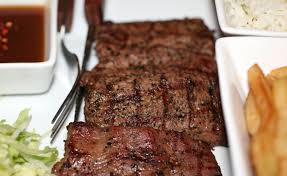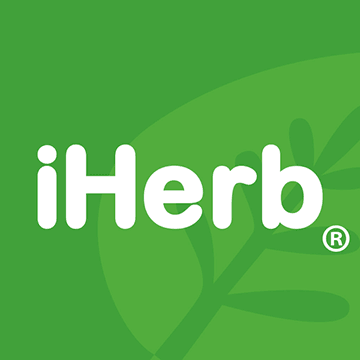Healthy Meals - Ginger Beef
Here's another healthy recipe to lose weight with. Healthy eating can also lead to weight loss.
Makes 2 Servings
Ingredients
• 2 sirloin steaks (4oz each), cut in strips
• 1 tablespoon olive oil
• 1 small onion, diced
• 1 clove garlic, crushed
• 2 diced tomatoes
• 1 teaspoon ground ginger
• 4 tablespoons apple cider vinegar
• Salt and pepper
Directions
1. Place the oil in a large skillet and brown the steaks in it over medium-high heat.
2. When both sides are well-seared, add the onion, garlic, and tomatoes.
3. In a bowl, stir the ginger, salt and pepper into the vinegar and add that mixture to the skillet, stirring to combine.
4. Cover the skillet, turn the heat to low, and let the whole thing simmer until liquids evaporates completely.
Nutritional Facts
(Per Serving)
Fat: 8g
Simply stated, it's a unique way of preparing food that combines nutrients specifically geared for melting off body fat FASTER than normal.
Here's what I really love about Metabolic Cooking:
1. The recipes are made from foods with a high Metabolic Thermo-Charge; more calories burned faster without losing taste...
2. They structured the cookbooks around their incredibly helpful "Metabolic Nutri-Profile"... makes it SUPER easy to use...
3. It's been specifically designed to fight the Metabolic Adaptation Phenomenon: That is what happens when you are on a dietplan and you all of a sudden stop dropping body fat!
Taste, ease, and metabolism-boosting power. Find more Metabolic Cooking Recipes for Fat Burning Food here.
Ted.com video alert : Eva Vertes: Meet the future of cancer research. Eva Vertes — only 19 when she gave this talk — discusses her journey toward studying medicine and her drive to understand the roots of cancer and Alzheimer’s.
Fat Burning Recipes to Die for!
- Fat Loss Tips - Thermoccino Smoothie
- Anabolic Cooking Breakfast Recipe - Blueberry Oatmeal
- Breakfast Recipe - Apple & Cinnamon High Protein Muffins
- Healthy Meals - Ginger Beef
- Healthy Foods - Hot Paprika Shrimp
- Healthy Eating - Quinoa Burritos
- Fat Loss Diet - Cajun Style Sweet Potatoes
- Weight Loss Meal Ideas - Kale Chips
- Weight Loss Diet - Southwestern Eggs
- Healthy Dinner - Asian Turkey Burgers
- Healthy Dinner Recipe - Apple Mustard Pork Tenderloin
- Weight Loss Recipe for World Famous (Paleo) Fudgy Brownies
- Healthy Dessert Recipe for Apple Oatmeal Pancakes
NUTRIENTS:
What the Body Needs and What it Doesn’t
Our bodies need nutrients, vitamins, minerals and water for good health and proper functioning.
Amazingly, the human body is capable of producing thousands of nutrients that it needs to sustain its own life.
The nutrients that the body manufactures itself are known as “non-essential” nutrients because the body is able to actually produce those nutrients itself and it’s not essential that you go out and get them from the food you eat.
Non-essential nutrients: the nutrients manufactured by your body that you do not need to get from the food you eat.
Conversely, “essential nutrients” are those nutrients that you must get from the food you eat. To sustain life, it is essential that you get these nutrients from your dietary intake.
Essential nutrients: the nutrients you must get from your diet because they are not being made in the body. Some examples of essential nutrients include water, proteins, fats, vitamins and minerals.
One very common nutrient that has been purposely omitted here are carbohydrates. The biological fact of the matter is that there is not a single carbohydrate that is essential to the human diet...not sugar...not starch...not fiber.
The fact is, carbohydrates do not provide any nutritional benefit to the human body—none whatsoever. You will learn a lot more about this in the coming sections.
The 3-Week Diet is about maximizing the nutrients that we do need while restricting those that we do not. Really, it is all about eating the right foods in the right quantities at the right time. When done correctly, we are able to put our body into a 24/7 fat burning mode.

PROTEIN, FAT, CARBOHYDRATES
The primary nutrients humans consume are protein, fat and carbohydrates. Understanding the role each of these primary nutrients plays on our health and on our ability to gain or lose weight is an important feature of the 3 Week Diet. I strongly encourage you to familiarize yourself with this portion of the 3 Week Diet, as it will have long lasting ramifications on your daily life.
Protein
Proteins are the foundation of your body’s cells, tissues and organs. They are essential to your muscles, hair, skin, hair, organs and hormones.
While the body can survive without eating another carbohydrate and while it can last for extended periods without eating fat, a lack of protein in your diet will cause degeneration of your muscle tissue and organs, which will eventually lead to death.
Knowing how important protein is to the body, it is unbelievable to see how many people still get most of their calories from high-carbohydrate diets.
Several studies have shown that the recommended daily allowance for protein consumption is far lower than it should be...especially for those engaged in regular exercise.
What this research has shown is that people following the “recommended daily allowance” of protein consumption while engaging in regular physical activity, were actually losing valuable muscle tissue because there was not enough protein in the body to repair and rebuild their muscles after their workouts.
Proteins are made up of amino acids and there are just 20 amino acids that make up ALL human proteins. Of these 20 amino acids, the body can only produce 12 of these itself.
This means the other eight amino acids must be obtained through the foods you eat. Lysine, leucine, isoleucine, methionine, phenylalanine, threonine, tryptophan, and valine are the essential amino acids that are not made by the body (there are two others necessary for infants and small children). We get these amino acids when we consume protein sources like meat, fish, poultry and legumes.
Protein sources that contain adequate amounts of all of the amino acids are called “complete proteins.” Those food items that do not contain all or adequate amounts of amino acids are know as “incomplete proteins.”

In general, animal proteins (meat, fish, poultry, cheese, eggs) are considered “complete proteins.” The “incomplete proteins” are those that are vegetable based, usually in the form of grains, legumes, nuts and seeds. To get enough essential amino acids through vegetable protein, one usually has to combine several different food groups together in a strategic combination.
Breaking down and processing protein takes a lot more energy and much more time than it does to break down other nutrients. In other words, the body has to work a lot harder to digest protein than it does with carbohydrates and fat.
The extra energy it takes to break down and process protein reduces the amount of energy your body receives from that food it consumed. Also, because it takes longer to break down and to assimilate protein, the process of emptying the stomach takes longer as well, which causes us to feel full longer, which reduces hunger pangs.
It is believed that the body can only use about 50% of the protein we eat. This means the other 50% is eliminated from the body as waste because protein is not stored in the body the same way that fat and carbohydrates are. So, when you eat calories primarily from protein, you can rest assured that these protein calories are repairing and rebuilding your body with the excess being eliminated as waste.
The extra protein will not be stored as body fat. As you will see, this is in stark contrast to excess carbohydrates and fat we eat, which are stored on our bodies in our fat cells instead of being eliminated.
Adding protein to your meals causes your body to release a hormone called glucagon. Glucagon works to slow down the harmful effect of excess carbohydrates from being deposited into our fat cells. It does so by slowing the rate of absorption of those carbohydrates.
Additionally, there are new studies that have shown that when the body releases glucagon (by consuming protein in your diet), it also works to stimulate fat-burning by freeing up your stored body fat, so that it can be used to fuel your body.
As you will see, when we increase protein consumption and significantly decrease the amount of carbohydrates we consume, we benefit from a dual fat-burning effect.
On one hand, when the body does not have carbohydrates to turn to, to fuel the body, it begins to use stored body fat. Secondly, the release of glucagon into the body appears to have the added effect of attacking the fat stores that the insulin has worked to preserve.
The 3 Week Diet is strategically designed to take advantage of both these events.

Fat
Unfortunately, fat has received a bad rap for decades. So much so, that it has become ingrained in our minds to intuitively reach for anything that says “low fat” even when we know better!
The notion that fat makes us fat makes perfect sense at face value, especially when you considered how calorically dense fat actually is. A gram of fat contains 9 calories while the same gram of protein or carbohydrates are only 4 calories.
Fat doesn’t have anywhere near the thermic effect that protein does (only 3% vs 30%), so consuming fat is not necessarily going to “turbo charge” our metabolism. On the same token, it is important to note that fat by itself also does not make us fat.
In fact, fat plays an important role in many parts of the body. While we can go for long periods of time without fat, we cannot live without it completely.
Those fats that we cannot live without are known as essential fatty acids (EFAs). Research has shown that these EFAs actually help us burn the stubborn, stored body fat that we want to get rid of, in addition to numerous other health benefits.
Fat Cells
Recently, research has shown that once a fat cell is created, it never goes away. Fat cells get larger and larger until they can no longer hold stored fat. When this happens, your body creates new fat cells to hold the excess. And again, once those new fat cells are created, they are yours for life.
While we cannot totally eliminate fat cells from the body, we can get rid of the gooey fatty acids and dangerous triglycerides that those fat cells are holding which will make us thinner.
Understand that fat is actually the perfect fuel for your body. When we can switch your body to using this “better” fuel, we can effectively turn your body into a 24/7 fat-burning machine.

Carbohydrates
Although carbohydrates are the most common source of energy in humans, the simple fact is, there is not a single carbohydrate that is essential to human life.
Carbohydrates are classified into two types: Simple & Complex.
Simple carbohydrates are also known as simple sugars. Simple sugars are those found in refined sugars (and the foods they are made with like cookies, candies, etc) but also in food like fruit and milk.
Complex carbohydrates are known as starches. Starches include grain products such as cereals, bread, pasta, crackers and rice. Like simple carbohydrates, complex carbohydrates can be refined or left unrefined. Refined carbohydrates are considered to be less healthy as the refining process strips away much of the vitamins, protein and fiber.
Unrefined carbohydrates cause less insulin spike and because of that, they are considered to be the most healthy of the carbohydrates.
Regardless of whether the carbohydrates are simple or complex, they both cause spikes in blood sugar. As you will see shortly, these spikes in blood sugar are the #1 cause of unwanted body fat
Return to Feed Them Right & More Recipes
My Journey from US size 0 to 8 & Back
(I sacrificed my body to science just for you, my dear blog readers)
 |
After my 3rd kid, I was a size 6-8 (depending on my dinner). I really tried everything:
|
- Tummy patches from Korea - You can't use this everyday coz' in the Singapore heat, it gets itchy. The verdict is still out on this, I think I just got an extremely itchy & sweaty stomach, with a slight loss in belly fat.
- Marie France Bodyline Slimming Treatments - I tried a cocktail of all their treatments (1 each at a promotional price). I did lose quite a bit of my weight gain from my pregnancies and most of my stomach fat (my problem area), but the pounds rushed right back after I stopped the program (Who can spend thousands of $$$ to maintain my post-treatment weight? Darn, aren't I supposed to be able to keep the weight off on a semi-permanent basis?).
- Body wraps & 'Lipolysis' - OK, be careful of this. You can suffer so much water loss through sweat and dehydration that you actually feel dizzy & unwell. The inch loss and weight loss is imaginary as you will definitely need to drink water & Boom! It's baaaaccccck...
- Indonesian Jamu massages - This was my first treatment & the massage was quite painful (1 hour's worth of 'No pain, no gain') & there appeared to be bruises on my tummy. The massage was supposed to 'soften' the hard crystallized fat in your belly!
- Zaggora Hotpants - I loved these hotpants for running, you sweat like a pig under the wetsuit material of the hotpants and feel like you have accomplished a whole lot. I did get my amazing trim thighs!
- 3 Week Diet - I am working on getting my tummy as flat as possible and maybe getting that line down the middle of your stomach if you are really in great shape for a woman. I am on a reasonable high protein-low carb diet plan (No Atkins diet for me!). By reasonable, I mean I eat like a normal person, no starvation required. In fact, I try to eat small meals 4 hourly, supplemented with Fish oil, Whey protein, CLA, Leucine, Greens+ Superfoods, Fat burners and plenty of water to clear the toxins from my body. (Work in progress - I will report back to you of the results)
My After weight loss picture was taken at the beginning of this year and I am 45 years old (2015). I am a US size 2-4 now. I don't think I will ever be a size 0 again in this lifetime & be able to slip on a dress without even unzipping it (like in the good ole days... never mind, there is always my next life.)
In case you think I have skinny Chinese genes, nope, my grandfather had pants 3 normal-sized guys could get into. My mother used to horrify me with stories of how my aunt's 20 inch waist before marriage became 20 inch thighs after her 4 kids. I was determined not to walk down that scary path of permanently being called 'Auntie' by all and sundry.
Recent Articles
-
The Anti-Cancer Diet - The Ketogenic Diet and Cancer
Mar 11, 24 04:47 AM
If you have always wanted to know what an Anti-Cancer Diet would be like and learn why you should be on a Ketogenic Diet (A Low Carb Diet). -
Earliest Signs of Pregnancy
Jan 22, 24 04:14 AM
What are the Earliest Signs of Pregnancy? Are you wondering, "Am I Pregnant?" Early pregnancy symptoms are listed here. -
Hot Paprika Shrimp Recipe - Is your food making you FAT?
Jan 22, 24 02:51 AM
Healthy Foods like Hot Paprika Shrimp can form part of a weight loss diet with Metabolic Cooking. Is your food making you FAT or burn MORE fat?
MomsWisdom, a Complete guide for Pre pregnancy preparation, Pregnancy care and New mom guide for Childhood
Gives honest parenting advice to mothers on how with the right mindset and preparation, you can raise happy, healthy, well-adjusted children who outperform others academically.
www.flickr.com
|
Who says kids don't have fun in Singapore?
See Singapore images on Flickr.
Festivals in Singapore
- Lantern Festival in Chinese Garden
- Singapore National Day Parade
- Hungry Ghost Month
- Singapore Zoo
- Jurong Bird Park
- Singapore Botanic Gardens
- Jacob Ballas Children's Garden
- Gardens by the Bay
- Marina Barrage
- MacRitchie Reservoir
- Rail Corridor near Rifle Range Road
- Bishan Park
- Tobogganing in sunny Singapore
- Singapore Science Centre
- Museums
- Shichida Class
Amazing Flora and Fauna
- Interesting Animals
- Colourful Plants
For more things to do in Singapore, go to Kids Play in Singapore.
Boards
Inspiration for Moms
Healthy Snacks
Kids having Fun
Get your Kids & Babies' Supplements here!
New customers receive $5 off their first order when you apply Rewards Code : BIX059

Tel : +65-9685 7942
Recent Articles
-
The Anti-Cancer Diet - The Ketogenic Diet and Cancer
Mar 11, 24 04:47 AM
If you have always wanted to know what an Anti-Cancer Diet would be like and learn why you should be on a Ketogenic Diet (A Low Carb Diet). -
Earliest Signs of Pregnancy
Jan 22, 24 04:14 AM
What are the Earliest Signs of Pregnancy? Are you wondering, "Am I Pregnant?" Early pregnancy symptoms are listed here. -
Hot Paprika Shrimp Recipe - Is your food making you FAT?
Jan 22, 24 02:51 AM
Healthy Foods like Hot Paprika Shrimp can form part of a weight loss diet with Metabolic Cooking. Is your food making you FAT or burn MORE fat?




